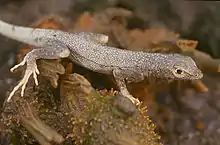| Microlophus theresiae | |
|---|---|
 | |
| Scientific classification | |
| Domain: | Eukaryota |
| Kingdom: | Animalia |
| Phylum: | Chordata |
| Class: | Reptilia |
| Order: | Squamata |
| Suborder: | Iguania |
| Family: | Tropiduridae |
| Genus: | Microlophus |
| Species: | M. theresiae |
| Binomial name | |
| Microlophus theresiae (Steindachner, 1901) | |
| Synonyms[2] | |
| |
Microlophus theresiae, commonly called Theresia's Pacific iguana, is a species of lizard in the family Tropiduridae.
Etymology
The specific name, theresiae, is in honor of Princess Theresa of Bavaria,[3] who collected the type specimens.[2]
Geographic range
Habitat
The preferred natural habitats of M. theresiae are desert and shrubland, at altitudes from sea level to 200 m (660 ft).[1]
Diet
Reproduction
References
- 1 2 Perez, J.; Quiroz Rodriguez, A.; Abadie, K. (2015). "Microlophus theresiae". IUCN Red List of Threatened Species. 2015: e.T48444306A48444315. doi:10.2305/IUCN.UK.2015-4.RLTS.T48444306A48444315.en. Retrieved 19 November 2021.
- 1 2 3 4 5 Species Microlophus theresiae at The Reptile Database www.reptile-database.org
- ↑ Beolens, Bo; Watkins, Michael; Grayson, Michael (2011). The Eponym Dictionary of Reptiles. Baltimore: Johns Hopkins University Press. xiii + 296 pp. ISBN 978-1-4214-0135-5. (Microlophus theresiae, p. 264).
Further reading
- Schlüter U (2000). "Wüstenkielschwanzleguane aus Peru ". Draco 1 (4): 44–49. (in German).
- Steindachner F (1901). "Herpetologische und ichthyologische Ergebnisse einer Reise nach Südamerika mit einer Einleitung von Therese Prinzessin von Baiern ". Anzeiger der Kaiserlichen Akademie der Wissenschaften, Mathematisch-Naturwissenschaftliche Classe 38: 194–196. (Tropidurus theresiae, new species, p. 195). (in German).
- Torres-Carvajal O (2004). "The Abdominal Skeleton of Tropidurid Lizards (Squamta: Tropiduridae)". Herpetologica 60 (1): 75–83. (Microlophus theresiae, new combination).
This article is issued from Wikipedia. The text is licensed under Creative Commons - Attribution - Sharealike. Additional terms may apply for the media files.
